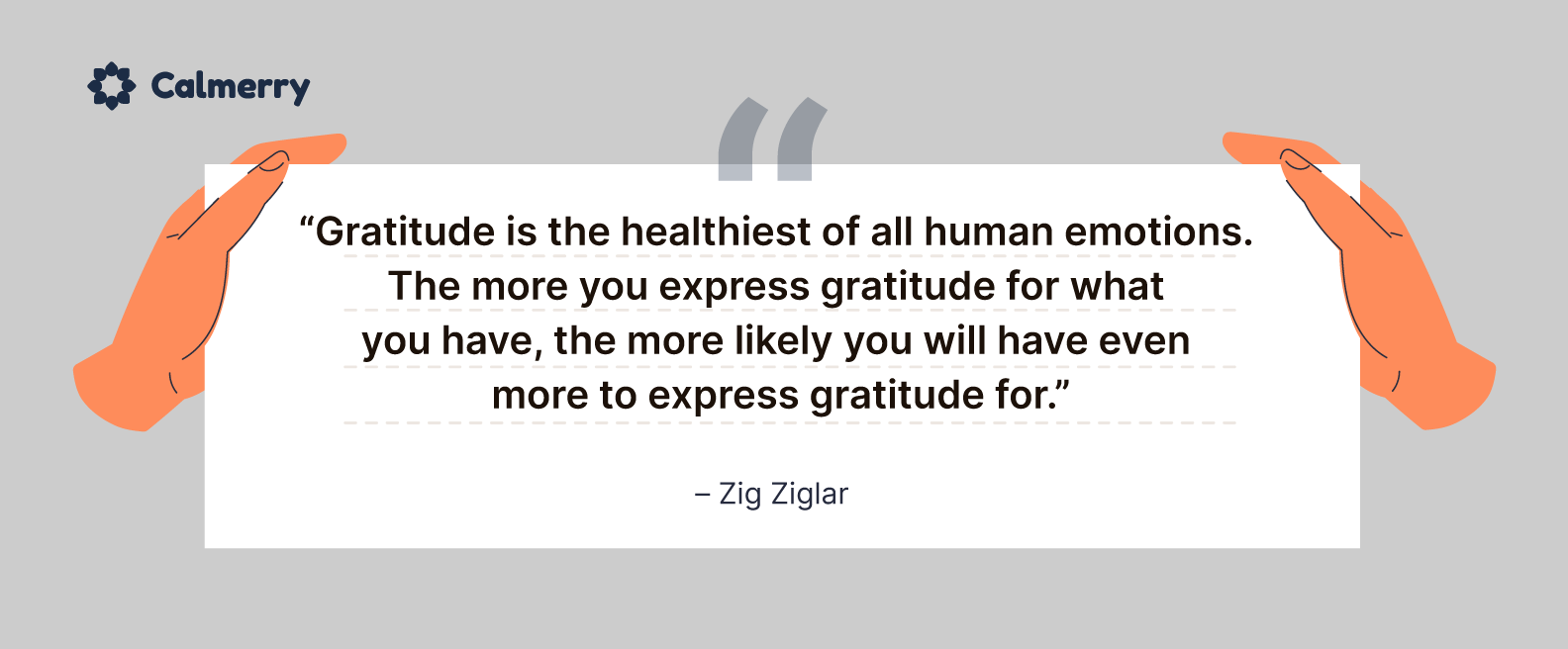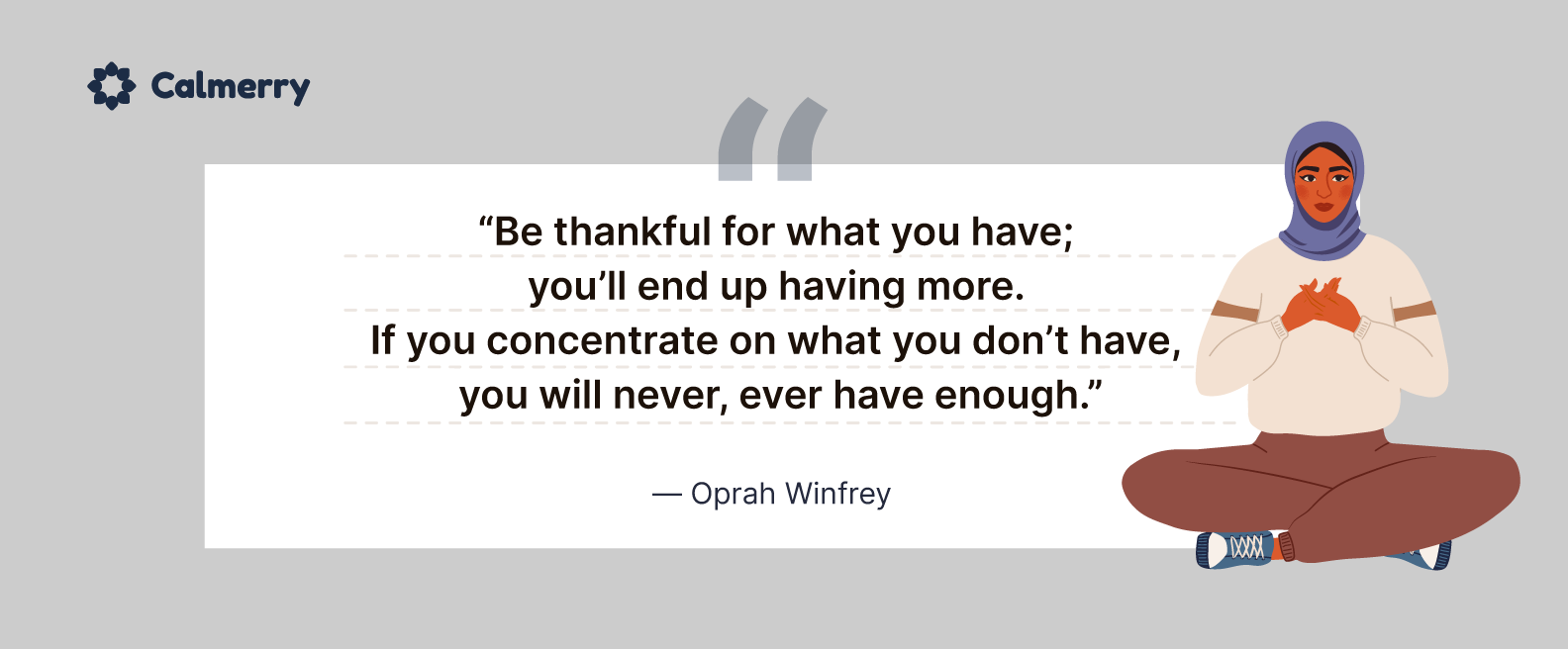How Gratitude Makes You Happier

In this article
Many of us express gratitude by saying “thank you” to a person who has helped us or when we’re given a gift. Since childhood, we’ve learned to thank automatically and as a social rule.
But gratitude is more than the action of showing good manners. It’s a positive, conscious, social emotion that has roots in evolutionary history. It may have evolved as a survival mechanism to drive the reciprocal altruism of helping others and being helped in return.
For millennia, gratitude was encouraged by religious and cultural traditions as a moral virtue and was a popular topic among philosophers who emphasized that it’s vital for every person to be good and moral. Now, gratitude has become one of the cornerstones of living a mindful life and is an excellent path to psychological well-being and happiness.
Let’s take a look at the positive benefits of gratitude and how you can learn to practice gratitude in your daily life.
What is Gratitude?
Many researchers, psychologists, and sociologists have tried to pin down exactly what gratitude is. In its simplest form, it is the thankfulness or appreciation a person feels when something positive occurs.
This positive action or event might be:
- Natural or lucky occurrences: This could include the weather being unseasonably warm when you were expecting thunderstorms. You may experience gratitude in being able to enjoy an unexpectedly beautiful day.
- A conscious act: Intentional actions that may lead to feelings of gratitude could include receiving a gift from a friend out of the blue, or your partner completing all of the vacuumings before you return home from work.
Both natural and intentional occurrences can make us feel thankful for the people we have in our lives or the luck we experience.
Psychologists have concluded that “gratitude is the appreciation of what is valuable and meaningful to oneself.” [1] Sansone, R. A., & Sansone, L. A. (n.d.). Gratitude and well being: the benefits of appreciation. PubMed Central (PMC). https://www.ncbi.nlm.nih.gov/pmc/articles/PMC3010965/ It can also be seen as a “social emotion signaling recognition of the things others have done for us”. [2] Fox, G. R., Kaplan, J., Damasio, H., & Damasio, A. (2015). Neural correlates of gratitude. Frontiers in Psychology, 6. https://doi.org/10.3389/fpsyg.2015.01491
Why gratitude matters
Scientists argue that gratitude is more than feeling thankful: it involves a deeper appreciation of receiving something tangible or intangible from other people. It requires us to see how we’ve been supported by others.
Gratitude can be thought of as an emotional experience that has three levels: a spontaneous emotion like feeling grateful after receiving a gift, a mood, or a personality trait.
Some people may have more grateful dispositions than others and be more likely to experience grateful emotions and moods.

RRobert Emmons, a leading gratitude researcher, says that gratitude has two key components: affirmation of goodness and figuring out where that goodness comes from.
First, we acknowledge that there are good things in the world, and gifts and benefits we’ve received. Although life is not perfect, there are many positive aspects that make it worth living, so we start to experience joy and gratefulness.
Second, we recognize that the sources of this goodness are outside of ourselves. We acknowledge that the good things in our lives come from the outer world, so the natural second step is experiencing gratitude towards people around us, nature, God, luck, fate, avoiding a mistake, and more.
People can feel and express gratitude by:
- Applying it to the past (reflecting on happy childhood memories)
- Being thankful for the present (not taking things they have for granted)
- Being grateful for what’s to come (being hopeful and optimistic about the future).
Gratitude is good
Gratitude comes with a host of benefits that can make our lives more meaningful. It’s a powerful positive force that has a great impact on our physical health, emotional well-being, motivation, and sense of belonging.
Gratitude allows us to recognize our connection to other people and our interdependence. It helps strengthen current social relationships with romantic partners, families, friends, and colleagues and form new social bonds.
Gratitude can help build empathy for others and inspires us to be more generous and prosocial. It motivates us to show kindness in return and act in ways that benefit other people.
Expressing gratitude reminds us of how special our lives are, even when we’re facing challenging or stressful situations. Focusing on good things in your life helps you calm your fears and anxiety and maintain a positive outlook in uncertain situations.

Gratitude can give you a perspective from which you can interpret negative life events, making you more stress-resistant and resilient.
When you feel grateful, you don’t waste your energy on rejecting or denying the negative but learn to accept the negative thoughts that you have or the situations you’re in.
Gratitude and happiness
According to a plethora of positive psychology research, there is a definite link between gratitude and happiness. Gratitude tends to focus you on what you have, replacing the focus on what you might be lacking. [3] Kerry, N., Chhabra, R., & Clifton, J. (2023). Being thankful for what you have: A Systematic Review of evidence for the Effect of gratitude on life satisfaction. Psychology Research and Behavior Management, Volume 16, 4799–4816. https://doi.org/10.2147/prbm.s372432
That turns your mental focus to the positive, which compensates for a natural tendency of the human brain to focus on worries, threats, and negative aspects of life.
Gratitude creates positive emotions, like contentment, joy, pride, and hope. Research has shown that positive emotions are incompatible with negative emotions, so you can’t feel both grateful and unhappy. [4] Fredrickson, B. L. (2001). The role of positive emotions in positive psychology: The broaden-and-build theory of positive emotions. American Psychologist, 56(3), 218–226. https://doi.org/10.1037/0003-066x.56.3.218
When your mind focuses on all you’re thankful for, this positive emotion can make you pay less attention to negative information, and you’re more likely to feel joy.
We often spend much time and energy pursuing things that we currently don’t have. Gratitude helps us change our priorities.
Focusing on what you have and appreciating it right now gives you a feeling of fullness – what you have is enough. And this feeling is associated with contentment, so grateful people feel more satisfied with their lives.
Gratitude and self-esteem
Gratitude as a trait has the ability to increase self-esteem. When we feel grateful, we often view ourselves as benefiting from the generosity of other people, which makes us feel valued.
These feelings increase our self-worth and improve our psychological well-being.
Besides, expressing gratitude is an intrinsically rewarding process. Being grateful for just being alive because tomorrow isn’t guaranteed can motivate some people to seize the day and focus on self-improvement to be their best selves today.

What does gratitude do to the brain?
The idea that being thankful may make you feel better has also been supported by neuroscientists. They suggest that practicing gratitude can trigger changes in the brain that improve mood.
Brain changes
Gratitude changes the pathways within the brain. [5] Kini, P., Wong, J., McInnis, S., Gabana, N., & Brown, J. W. (2016). The effects of gratitude expression on neural activity. NeuroImage, 128, 1–10. https://doi.org/10.1016/j.neuroimage.2015.12.040 Over time, experiencing gratitude occurs spontaneously as the brain creates new neural connections for emotional experiences.
As the connections strengthen, the pathways created within the brain become permanent. This means that a positive, grateful nature is cultivated. Your overall mindset may shift from feeling anxious to feeling thankful, inspired and grateful.
Neurotransmitters and hormones
As well as strengthening neural pathways, the brain becomes more capable of releasing the so-called “happy hormones” dopamine and serotonin. With strengthened neural connections, the brain releases these neurotransmitters more readily, leading to more frequent and sustained periods of happiness.
Gratitude slows cortisol production, a stress hormone, which may significantly benefit your mental health.
All of these changes in the brain can lead to some alleviation of the symptoms of anxiety and depression, as well as giving your self-esteem a real boost.
How to cultivate gratitude?
Gratitude doesn’t always come naturally, but we can develop a grateful mindset intentionally, using a number of research-based practices. They involve consciously focusing on being appreciative for what you have.
Practicing gratitude can help train your mind to identify positive aspects of your life and appreciate good things in your life as they happen. And the more gratitude you express, the happier you’ll feel.
Here are some effective ways to cultivate a grateful mindset, recommended by experts.
Write a thank-you note
Think about a person you may not have taken the time to fully thank for their positive impact on your life. It can be your parent, friend, teacher, or mentor who has been especially kind to you.
Spend some time reflecting on the benefits you gained as a result and write a thank-you letter or email to express your gratitude for everything they’ve done for you.
Be detailed and try to express all the wonderful qualities of this person. Send your letter or, if possible, deliver it to your recipient personally.
Keep a gratitude journal
Keeping a gratitude journal is one of the best ways to cultivate gratitude. This exercise will help you remember the good experiences, people, events, or things in your life and enjoy the positive emotions that come with them.

Make it a habit to write down three things for which you’re grateful at the end of each day and explain why. You can note positive things from your past, present, and future.
It’s also useful to come back and read your own words of gratefulness at the end of the week.
Take a savoring walk
We’re living in a fast-paced world and are bombarded with information centered on negative events, so it’s challenging to focus on the bright side of life.
A savoring walk is a simple mindfulness exercise that can help you connect to positive emotions and enjoy the benefits of practicing gratitude.
Try taking a 20-minute walk by yourself every day for at least a week. Ideally, you should take a different route each time.
The idea is to take time to notice and appreciate your surroundings, so you should actively look for positive things around you: sights, smells, sounds, and other sensations that bring you joy.
Final thoughts
Gratitude is a powerful emotion that is associated with happiness, and it’s a great emotion to cultivate on a regular basis. Feeling and expressing gratitude can change the way you think about life and teach you to notice good things that you might otherwise take for granted.
Take some time to be thankful and practice regularly to make it a habit that translates into a trait. That will help you maintain optimal physical and mental health and emotional well-being.
And if you’re looking for professional help with your mental health issues, Calmerry therapists can provide you with support and quality care.
Our mental health professionals will teach you coping skills and help you make positive changes.
Sansone, R. A., & Sansone, L. A. (n.d.). Gratitude and well being: the benefits of appreciation. PubMed Central (PMC). https://www.ncbi.nlm.nih.gov/pmc/articles/PMC3010965/
Fox, G. R., Kaplan, J., Damasio, H., & Damasio, A. (2015). Neural correlates of gratitude. Frontiers in Psychology, 6. https://doi.org/10.3389/fpsyg.2015.01491
Kerry, N., Chhabra, R., & Clifton, J. (2023). Being thankful for what you have: A Systematic Review of evidence for the Effect of gratitude on life satisfaction. Psychology Research and Behavior Management, Volume 16, 4799–4816. https://doi.org/10.2147/prbm.s372432
Fredrickson, B. L. (2001). The role of positive emotions in positive psychology: The broaden-and-build theory of positive emotions. American Psychologist, 56(3), 218–226. https://doi.org/10.1037/0003-066x.56.3.218
Kini, P., Wong, J., McInnis, S., Gabana, N., & Brown, J. W. (2016). The effects of gratitude expression on neural activity. NeuroImage, 128, 1–10. https://doi.org/10.1016/j.neuroimage.2015.12.040
online therapy
live video session



